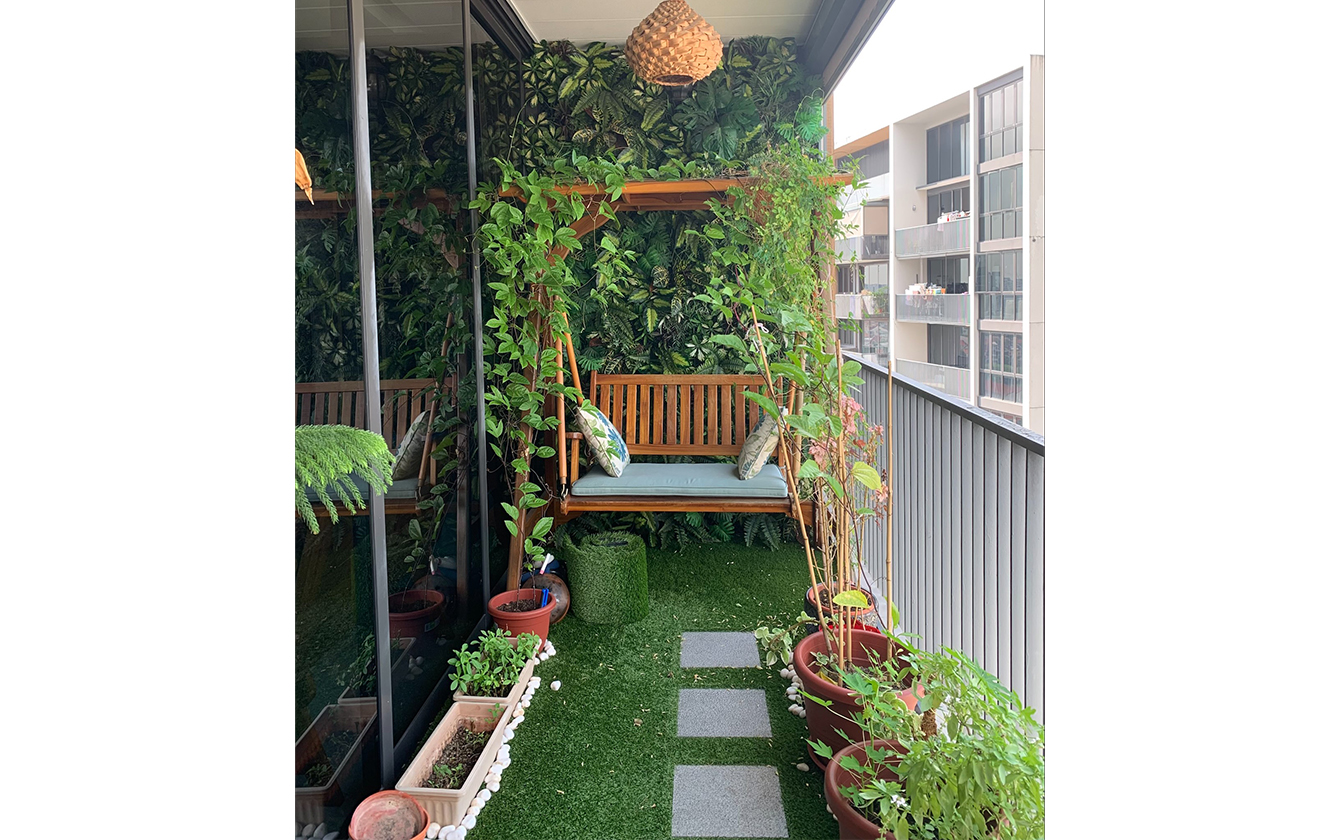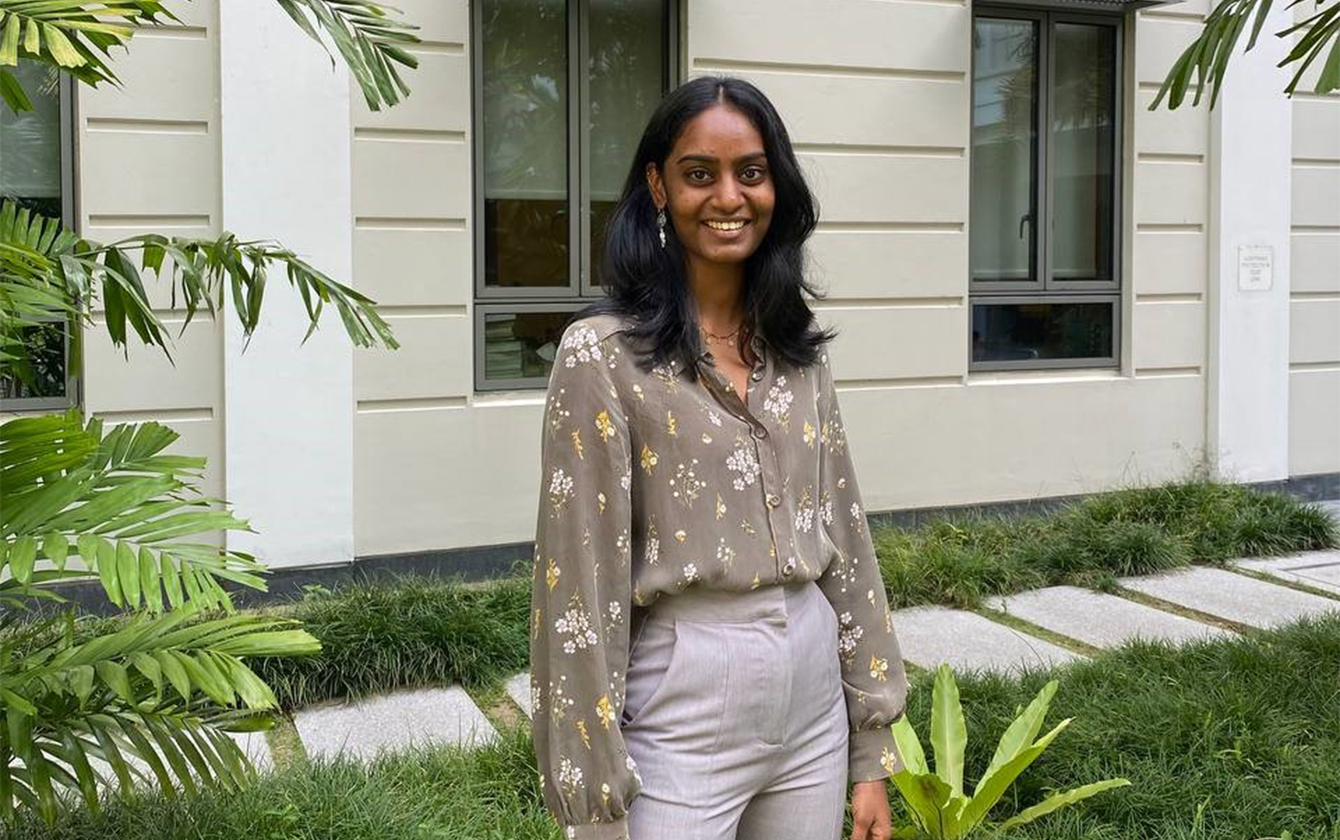

June 2022 Issue: Co-operator Newsletter Quarterly Issue 2022
SNCF Scholar U Dharshini Wants Singaporeans To Re-think Food Security in Singapore

This story was first published on Youthopia SG.
It is a surreal feeling to have your feet warmed by a bed of grass, with green fields stretching for miles around you, sprouting new life.
That was how I felt in my father’s village in India, on the rice paddy fields that would be ready for harvest in the months to come.
However, growing up, I always saw myself living a life of paradox.

My grandparents are farmers who own a small fruit plantation in a rural village in India and played a crucial part in keeping people nourished, whereas I am a first-generation Singaporean who grew up comfortably without ever wondering (or worrying) about where the food on my dining table came from.
That was until I became older and visits to my grandparents back in India made me understand the scope and impact of their work on the plantation. It opened my eyes to the globalisation of food sources and provisions.
It was then that I realised that I was alienated from the significance of my family’s role in societies. Not just in India, but all over the world. That includes Singapore too because we import over 90 per cent of our food supply due to the limited land spaces that can be set aside for agriculture.
Why is it important to care?
Knowing where our food comes from – and growing it ourselves – allows us to appreciate and value it more than we do now, and also helps reduce our carbon footprint.
Initiatives such as the SG Fresh Produce logo and e-SG Farmers’ Market help cut down greenhouse emissions as food does not have to be transported far. They also tend to stay fresher and this, in turn, means less wastage. Buying local produce also supports our local farmers and enhances food supply resilience for Singapore.
Singapore, being a small island, is susceptible to the tiniest fluctuations in global food supply, food prices, or even global warming. One just has to look at how much pricier eggs have gotten in recent weeks. The hike was reportedly due to higher chicken feed prices and logistical costs, as well as global inflation.
Climate change carries a severe impact on our food systems. We might not think too much about it, but extreme weather events affect stable food production and lead to volatile food prices, putting food supply at risk. The pandemic is another reason that can disrupt Singapore’s access to imported food.
Even if we have a national stockpile of essential items that suggests we may not be at immediate risk of prolonged empty shelves in the supermarket, the reality is that we are living in an increasingly uncertain world where anything can change very quickly.
How then can Singapore strengthen our food security? I believe our youths may hold the key to the solution.
Cultivating budding green fingers
Youths today are more entrepreneurial and have a desire to influence the world in which we live. We are woke, aware of the issues that afflict our generations and are in the best position to make a difference. Exploring the cooperative business model and setting up an agriculture cooperative in Singapore may yield positive impact.
But why a cooperative business model? Cooperatives are membership-based business entities, where anyone and everyone can sign up depending on their alignment to the respective social missions. They are owned, controlled and run by their members to realise their common economic and social objectives. Most cooperatives also have a social mission that they stand for.
Globally, there are three million cooperatives in many areas of the community – from housing to retail and healthcare, among others – with over one billion members which accounts for 10 per cent of the employed population.
In Singapore, we have a wide range of cooperatives and they are no different. One name that comes to mind is the service cooperative Employment for Persons with Intellectual Disability, or E4PID as they are more commonly known. They started with the aim of empowering persons with disabilities by providing them long-term employment opportunities, and have gone on to set up The Mushroom Farm Project that employs a team of five people with intellectual disabilities to cultivate and grow edible gourmet mushrooms that are sold directly to consumers.
While there are no agricultural cooperatives in Singapore today, I believe that such a cooperative model has the potential to not just strengthen the security of our food supplies, but perhaps also make a difference in the world. In fact, there are many of such agricultural cooperatives around the world.
More importantly, an agricultural cooperative will bring together like-minded people to promote values that we want to inculcate among future generations of Singaporeans such as sustainable cultivation and diversification of food sources.
Two heads are always better than one. Imagine Singaporeans coming together and unearthing game-changing sustainable techniques of small-scale farming that does well in the unique agricultural landscape that our country is in, and then being replicated in other densely-populated urban jungles elsewhere.
That would be us making a mark in the world and leaving something behind for future generations.
More importantly, it serves as a form of nation-building with the community-based approach toward improving Singapore’s food security.
It helps too that the government’s push towards cultivating local agriculture has also created favourable conditions for new agri-businesses to flourish. With the Singapore Green Plan and our goal of reaching 30 per cent of food supply being sourced locally by 2030, there is funding to be tapped on for agricultural initiatives.
Taking small steps to make a big difference
It is not just the entrepreneurial youths who can play a part in our food sources.
The proliferation of urban farming now means that people of all ages can attempt to grow their own produce in their own homes!
My mother is a good example. She actively volunteers at urban farming collectives, such as Edible Garden City, and has picked up different techniques of small-scale urban farming which she has since applied at home, in our small balcony.

She used a plastic drink bottle to make a water drip system to water plants and learnt different methods of composting and seed germination.
In a few months, our sparse balcony became a thriving garden.
Looking back, I still remember the first hibiscus that bloomed and the first tomato she harvested from the garden. We were literally reaping the fruits of our labour – fresh and nutritious food!
Simple efforts like these, when carried out collectively, can go a long way in making a huge difference in bolstering our food security.
Seizing our future
I believe that these initiatives, coupled with the change in perception and behaviour from the community, can play a big part in strengthening our food sources via local agriculture.
We cannot dream forever. To build a future where our kids and their children can live and thrive, we must act now.
Learning so much about food sustainability has also driven me to take ownership over the food I consume.
Being a young adult myself, I want to be a part of the solution towards improving our food sustainability. I have plans to start an agricultural cooperative with a few friends from university. Together, we want to identify sustainable farming practices or methods that work best on the uniquely-Singaporean soil like regenerative or organic agriculture.

More importantly, my friends and I will not be alone on that journey. We can also count on the support of the Singapore National Co-operative Federation, the apex body of the cooperative movement in Singapore, who stand ready to support cooperatives with offerings to enhance their competencies and strengthen their social missions.
Perhaps in a few years’ time, you too can come to our agricultural cooperative project and feel the warmth from the lush greenery from a local agriculture project.
Hopefully, that is when you can taste the sweetness and freshness off your tongue, just as I did on my grandparents’ plantations.
By U Dharshini for Youthopia SG.



